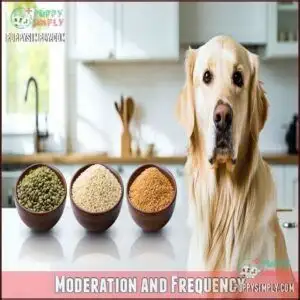This site is supported by our readers. We may earn a commission, at no cost to you, if you purchase through links.
 Yes, dogs can eat sesame seeds in moderation, and these tiny seeds can add a little nutritional boost to their diet.
Yes, dogs can eat sesame seeds in moderation, and these tiny seeds can add a little nutritional boost to their diet.
Packed with fiber, healthy fats, and a pinch of protein, sesame seeds may support your pup’s digestion and overall health.
That said, too much can lead to upset stomachs or even weight gain, so keep portions small—think of them as a sprinkle, not a snack.
Always avoid sesame-containing products loaded with salts or spices, as those aren’t dog-friendly.
If you’re unsure, check with your vet first.
Curious how to safely serve sesame seeds? Stick around for simple tips!
Table Of Contents
Key Takeaways
- Dogs can eat sesame seeds in moderation; they’re packed with nutrients like healthy fats, calcium, and protein.
- Always grind or crush sesame seeds to help your dog digest them and avoid choking hazards.
- Too many sesame seeds can upset your dog’s stomach or lead to weight gain, so stick to small portions.
- Avoid salted or spiced sesame products and consult your vet before adding them to your dog’s diet.
Sesame Seeds for Dogs
You might wonder if sesame seeds are safe for your dog and how they could benefit their health.
These tiny seeds pack a surprising punch of nutrients, but there are a few precautions you’ll need to keep in mind.
Nutritional Benefits
Sesame seeds pack a punch in terms of nutrition for dogs.
Packed with nutrients, sesame seeds boost energy, support bone health, and enhance your dog’s coat and overall well-being.
They’re rich in healthy fats and plant protein, supporting energy and muscle repair.
The impressive mineral content—calcium, magnesium, iron, and zinc—boosts bone health, while vitamin E and fatty acids enhance skin and coat vitality.
Plus, their antioxidant boost fights oxidative stress, adding to the many sesame seeds benefits for dogs.
Health Benefits
Adding sesame seeds to your dog’s diet can be a small change with big perks.
A sprinkle of sesame seeds can boost your dog’s coat, digestion, and overall vitality when added in moderation.
They deliver:
- Coat Health: Essential fats keep their fur shiny.
- Bone Strength: Calcium and magnesium promote strong bones.
- Immune Support: Zinc boosts immunity.
- Antioxidant Boost: Fights inflammation for overall wellness.
- Digestion Aid: Fiber improves tummy health.
These health benefits make sesame seeds good for dogs in moderation.
Similarly, sunflower seeds can provide antioxidant properties through Vitamin E.
Risks and Precautions
Feeding sesame seeds to dogs comes with risks.
Overeating can lead to digestive overload, causing diarrhea or discomfort.
Small seeds also pose a choking hazard, especially for tiny breeds.
Watch for dog sesame seed allergy symptoms like itching or swelling.
Breed sensitivity varies; consult your vet.
Weight management matters too—too many seeds can contribute to obesity.
Avoid sesame seed toxicity dogs fear.
Can Dogs Eat Sesame Seeds
Yes, dogs can eat sesame seeds safely in moderation.
These tiny seeds pack a punch with nutrients like protein, healthy fats, calcium, and magnesium, which can support your dog’s overall health.
While sesame seeds for dogs aren’t toxic, their small size means digestion can be tricky if they’re not ground or crushed first.
They’re a nice addition to meals or homemade recipes—just keep amounts small to avoid tummy trouble.
If you’re aiming for holistic benefits or thinking of a vegan diet for your dog, sesame seeds might be worth a try.
Still, moderation is key; too much may upset their stomach.
Similar to sunflower seeds, sesame seeds can provide antioxidant benefits through their vitamin E content.
If your dog ate sesame seeds by accident, don’t worry—just watch for any signs of discomfort and call your vet if needed.
Sesame Seed Safety Guidelines
When feeding sesame seeds to your dog, it’s important to follow simple safety guidelines to keep them healthy and happy.
Knowing the right serving sizes, preparation methods, and potential risks will help you avoid any unnecessary problems, and ensure you are providing a healthy experience for your dog.
Proper Serving Sizes
Serving sizes depend on breed specifics and guarantee moderation. For small dogs, limit seed quantity to 1/4 to 1/2 teaspoon daily; medium dogs can have up to 1 teaspoon.
Large dogs manage 1 to 2 teaspoons. Puppies need even smaller portions.
Keep treats occasional to control calorie impact and watch their overall nutrition carefully—less is often more!
Similarly, you should consider sunflower seeds’ benefits in moderation.
Best Ways to Incorporate
To safely add sesame seeds to your dog’s diet, focus on preparation and pairing.
Ground sesame seeds blend well with meals, while sesame seed oil can be drizzled lightly for flavor.
Explore these ideas:
- Sprinkle ground sesame seeds over dog food.
- Mix sesame seeds into treat recipes.
- Pair sesame seed oil with veggies.
- Try seed alternatives like flaxseeds.
- Combine seeds with nutritious dog food ingredients.
Consider also sesame-based dog treats for a convenient option to enhance your dog’s diet with sesame seeds and explore new flavors.
Avoiding Digestive Issues
Crushing sesame seeds before feeding helps your dog’s digestion by releasing nutrients and reducing digestive tract strain.
Start with a gradual introduction, offering small amounts to gauge tolerance. Their fiber content can be helpful but overwhelming in excess, leading to gastrointestinal upset.
Quantity control is key to avoid obstruction or digestive issues. Monitor responses, and consult a vet for guidance to ensure the best approach for your dog’s health, considering the potential for gastrointestinal upset.
Sesame Seed Health Risks
Feeding sesame seeds to your dog can come with certain risks, especially if they’re consumed in large amounts.
These tiny seeds may cause digestive issues, choking hazards, or even weight gain, so it’s essential to serve them in moderation, considering the potential for weight gain.
Digestive Issues and Allergies
Sesame seeds can spark serious trouble in a dog’s tummy if not handled right.
Overeating might trigger digestive issues, allergies, or even blockages.
Watch for these signs:
- Vomiting or diarrhea after eating seeds.
- Itching or skin irritation suggests allergic reactions.
- Gut obstruction, especially in smaller breeds.
- Puppy sensitivities to sesame components.
- Breed predispositions to digestive struggles.
Obesity and Weight Gain
Overfeeding sesame seeds might lead to obesity in dogs, especially if they’re already prone to weight gain.
These tiny seeds pack a punch with their high caloric content, which can easily exceed your dog’s daily needs if portion sizes aren’t controlled.
Balance calorie control with your pet’s exercise needs, and consider treat alternatives to keep them healthy and active without the extra pounds.
If your dog needs to gain weight, consider a calorie-dense diet instead, focusing on a healthy and active lifestyle.
Choking Hazards and Pancreatitis
When feeding sesame seeds to your dog, watch out for the small size, as they can be a choking hazard, especially for small breeds.
Their high fat content may also upset digestion and trigger pancreatitis in sensitive dogs.
To reduce obstruction risks, focus on proper seed preparation, like grinding or crushing, and practice portion control to guarantee safe digestion.
Feeding Sesame Seeds Responsibly
When feeding sesame seeds to your dog, it’s important to focus on moderation and proper preparation to avoid health issues.
Always monitor your pet’s reaction and consult your veterinarian before adding new foods to their diet.
Moderation and Frequency
Stick to dog dietary moderation by limiting sesame seeds to an occasional treat. Use proper portion control to avoid overdoing it, keeping daily limits manageable.
Try seed rotation for variety and balance. For alternative options, consider dog treat seed products.
Here’s a quick guide:
- Small dogs: ½ teaspoon
- Medium dogs: 1 teaspoon
- Large dogs: 1 tablespoon
- Serve occasionally, not daily
- Pair with a balanced diet
Monitoring Canine Health
Watch for changes in your pet’s behavior, including energy levels, stool consistency, and coat condition.
Allergy symptoms like itching or swelling can also appear. Weight changes or unusual pets symptoms could signal an issue.
Monitoring your dog’s health after adding sesame seeds keeps problems at bay. When in doubt, follow veterinarian advice to guarantee your dog’s well-being and overall health, which is crucial for preventing issues and ensuring your pet’s quality of life, making sesame seeds a consideration.
Importance of Veterinary Consultation
Before adding sesame seeds to your dog’s diet, consult your veterinarian.
Breed predispositions, puppy considerations, and existing conditions all affect their tolerance. A vet consultation provides personalized advice, ensuring dietary changes are safe.
Your vet’s guidance helps navigate any risks like allergies or digestive issues, giving you peace of mind and keeping your pup healthy.
It’s always better to double-check than regret later, as this ensures you are making informed decisions about your dog’s diet, which is crucial for their overall health.
Frequently Asked Questions (FAQs)
Can dogs eat foods with sesame seed oil?
Surprisingly, sesame seed oil isn’t toxic to dogs, but it’s like giving them a rich dessert—okay in moderation.
Use it sparingly, as its high fat content can upset their stomach or lead to weight gain.
Are black sesame seeds safe for dogs?
Black sesame seeds are safe for dogs in small amounts, offering nutrients like healthy fats and minerals.
Always grind or crush them for easier digestion, introduce gradually, and consult your vet to avoid potential issues.
Do sesame seeds affect dogs with dental issues?
A little goes a long way—sesame seeds can get stuck in a dog’s teeth, leading to discomfort or worsened dental issues.
Always grind seeds first, introduce them sparingly, and prioritize your pup’s dental care.
Can sesame seeds mix with other dog-safe seeds?
Yes, sesame seeds can mix well with dog-safe seeds like pumpkin, sunflower, and flaxseeds.
Together, they provide added nutrients, but stick to small portions to avoid digestive issues and always consult your vet first, considering complete concepts of dog health.
Are sesame seeds beneficial for senior dogs diets?
Senior dogs can benefit from sesame seeds in moderation, as they support joint health, enhance digestion, and provide essential nutrients like calcium and magnesium for stronger bones.
Always consult your vet before changing your dog’s diet to ensure sesame seeds are appropriate and to discuss the potential benefits of joint health.
Conclusion
Think of sesame seeds as little sprinkles of nutrition for your dog, not the main course.
These tiny seeds can offer fiber, healthy fats, and a touch of protein, but keep portions small to avoid digestive troubles or weight gain.
Stick to plain sesame seeds, avoiding salted or spiced versions.
Always start slow and watch your dog’s response, if you’re ever unsure whether dogs can eat sesame seeds safely, a quick check with your vet is always a smart move to ensure their safety and healthy response.
- https://www.rover.com/blog/can-my-dog-eat-sesame-seeds/
- https://butternutbox.com/blog/can-dogs-eat-seeds
- https://www.dogster.com/dog-nutrition/can-dogs-eat-sesame-seeds
- https://www.justanswer.com/dog-health/gp5it-dog-ate-almost-bag-sesame-seed-squares-cane.html
- https://www.masterclass.com/articles/can-dogs-eat-sesame-seeds














